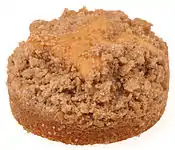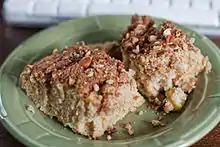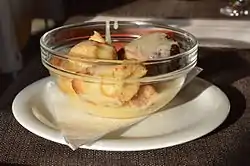Coffee cake
Coffee cake is any cake flavored with or intended to be eaten with coffee.[1] British coffee cake is typically a sponge cake flavored with coffee,[2] typically baked in a circular shape with two layers separated by coffee butter icing,[3] which also covers the top of the cake. Walnuts are a common addition, to make coffee and walnut cake.[4] In the United States, coffee cake generally refers to a sweet cake intended to be eaten with coffee or tea (like tea cake).[5][6] The American variety is presented in a single layer, flavoured with either fruit or cinnamon, and leavened with either baking soda (or baking powder), which results in a more cake-like texture, or yeast, which results in a more bread-like texture. They may be loaf-shaped, for easy slicing or baked in a Bundt or tube pan.
.jpg.webp) Coffee cake | |
| Type | Cake |
|---|---|
| Region or state | Germany |

History
Coffee cake—also referred to as gugelhupf or kaffekuchen—evolved from other sweet dishes from Vienna.[7] In the 17th century, Northern/Central Europeans are thought to have come up with the idea of eating sweet cakes while drinking coffee.[8][9] As the region's countries were already known for their sweet yeast breads, the introduction of coffee in Europe led to the understanding that cakes were a great complement to the beverage. Immigrants from countries such as Germany and Scandinavia adjusted their recipes to their own liking and brought them to America. Though the cakes varied, they all contained ingredients such as yeast, flour, dried fruit, and sweet spices. However, over time, the coffee cake recipes have changed as cheese, sugared fruit, yogurt, sour cream, have been used, leading to a denser, more cake-like structure. In the 19th century, American cooks also used coffee as an ingredient to thriftily use up leftovers, reducing waste, and flavor the cake.[10] The invention of pasteurization in America following World War I[11] also led to the creation of a new kind of coffee cake, called sour cream coffee cake.[12] Coffee cake is referenced in literary material as early as 1850[13] with references to gugelhupf going back to 1763.[14]
Varieties
American coffee cake
German women brought the concept of the kaffeeklatsch[15] to America. Contemporary coffee cakes in the US rarely contain coffee. Most are simple, singularly flavoured cakes that feature fruit, spices, or nuts. They may also feature a streusel or simple glaze topping, if any.[16] Streusel is German for "sprinkle" or "strew" and refers to the popular crumbly topping of butter, flour, sugar.[16]
A variety of crumb cake (Streuselkuchen) contains flour, sugar, butter, cinnamon granules, and sometimes oats or nuts, which are sprinkled over the coffee cake batter before it is baked.[16][17] Sour cream is also sometimes used in traditional American coffee cakes to both add a tart flavor and activate baking soda used as a leavening agent.[12]
Applesauce cake
Applesauce cake is sometimes prepared and served alongside coffee.[18][19][20]
Arany galuska
In Hungary, there is a type of coffee cake called arany galuska containing walnuts and cinnamon.[21]
- Coffee cake varieties
.jpg.webp) British Coffee cake
British Coffee cake An American style coffee cake with crumbles on top
An American style coffee cake with crumbles on top Applesauce coffee cake slices on a plate
Applesauce coffee cake slices on a plate
See also
- Amish friendship bread – has characteristics of both pound cake and coffee cake
- Bundt cake – a ring shaped cake similar to Gugelhupf
- Gooey butter cake – generally served as a type of coffee cake and not as a formal dessert cake
- Gugelhupf – sometimes served with coffee, during coffee breaks
- List of brunch foods
- List of cakes
- Teacake
- Tiramisu – a popular coffee flavored Italian dessert
References
- "What is coffee cake?". Baking Bites. 2010-10-29. Retrieved 2019-08-01.
- "Coffee Cake". BBC Good Food. BBC. Retrieved 1 June 2018.
- "Coffee cake with coffee buttercream, coffee glacé icing and candied walnuts". BBC Food. Retrieved 2019-08-01.
- Cloake, Felicity (16 April 2014). "How to make the perfect coffee and walnut cake". The Guardian. Retrieved 1 June 2018.
- Brennan, G. (2015). Brunch: Recipes for Cozy Weekend Mornings. Weldon Owen. p. PT 83. ISBN 978-1-61628-987-4.
- Fields, D. (2000). Debbi Fields' Great American Desserts: 100 Mouthwatering Easytoprepare Recipes. Simon & Schuster. p. 236. ISBN 978-0-7432-0205-3.
- "The Gugelhupf. A Bite of Delight". www.austria.info. Retrieved 2019-08-01.
- "History - National Coffee Cake Day, April 7". American Civil War Forums. Retrieved 2019-08-01.
- Olver, Lynne. "The Food Timeline: cake history notes". The Food Timeline. Retrieved 30 October 2018.
- "The Food Timeline: cake history notes". www.foodtimeline.org. Retrieved 2019-12-04.
- "American Cakes Throughout History | The History Kitchen". PBS Food. Public Broadcasting System. 2015-07-08. Retrieved 2019-08-01.
- Marks, Gil. "American Cakes - Sour Cream Coffeecake History & Recipe". Tori Avey. Retrieved 2019-08-01.
- The Gift. Pioneer Drama Service, Inc. 1850.
- Die dramatische Unterhaltung unter guten Freunden. Ein Lustspiel von 1 Aufz (in German). Kurtzböck. 1763.
- Jones, Evan (1993). American Food: The Gastronomic Story. Random House Value Publishing. ISBN 978-0517092651.
- "Coffee Questions". HowStuffWorks. HowStuffWorks. 2007-11-12. Retrieved 2019-12-02.
- Maxespresso (April 30, 2016). "The story of coffee cake". Retrieved October 9, 2017.
- Clarkson, Potter; Martha Stewart's Cakes' (September 24, 2013). "Recipe: Applesauce Coffee Cake". San Jose Mercury News. Retrieved September 28, 2015.
- Brownetone, Cecily (October 10, 1969). "Cooking Is Fun". Spokane Daily Chronicle. Retrieved 28 September 2015.
- "Applesauce Coffee Cake Recipes | Food Network Canada". foodnetwork.ca. Food Network (Canadian TV channel). Retrieved 2019-12-02.
- Marks, Gil (17 November 2010). Encyclopedia of Jewish Food. Hoboken, N.J: Wiley. ISBN 9780544186316. Retrieved 1 June 2018 – via Google Books.
Further reading
- Seibert Pappas, Lou (2012). Coffee Cakes: Simple, Sweet, and Savory. Chronicle Books. ISBN 978-1452112770. Retrieved January 1, 2013.
- Paré, Jean (2009). Coffee Cake Classics. Edmonton, Alberta Canada: Company's Coming Publishing, Limited. ISBN 9781897477106.
